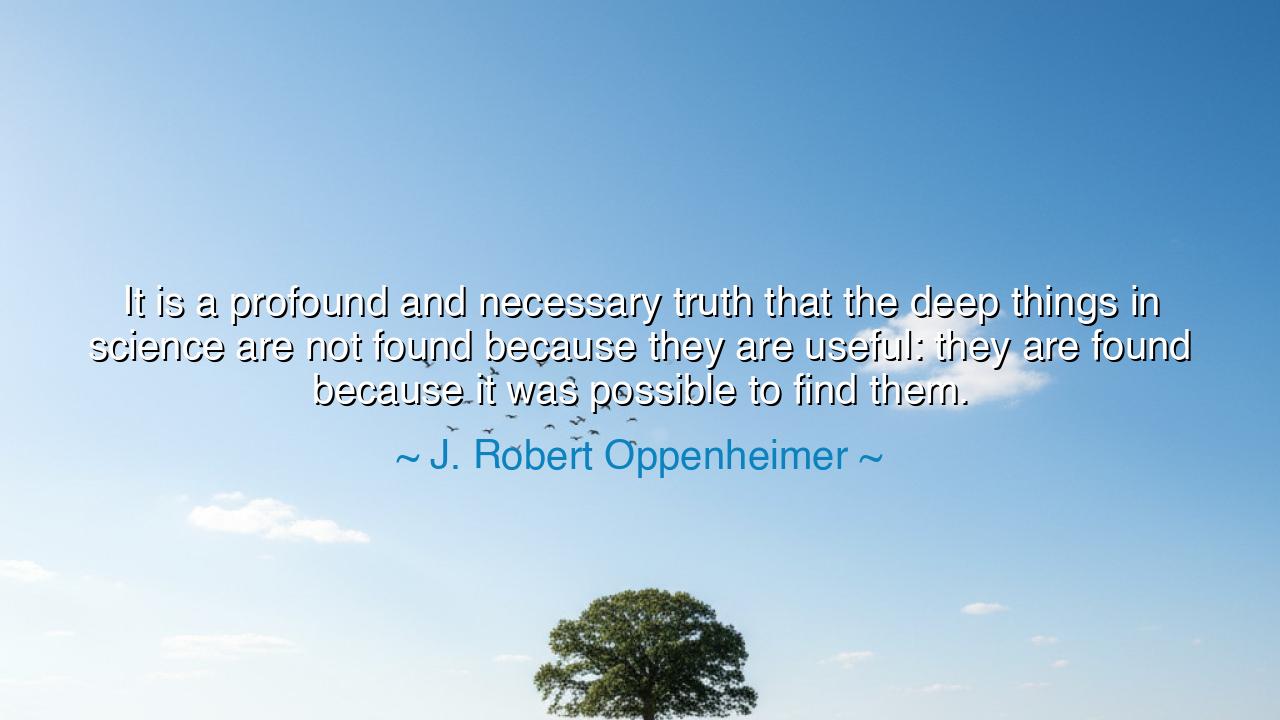
It is a profound and necessary truth that the deep things in
It is a profound and necessary truth that the deep things in science are not found because they are useful: they are found because it was possible to find them.






"It is a profound and necessary truth that the deep things in science are not found because they are useful: they are found because it was possible to find them." These words, spoken by J. Robert Oppenheimer, echo the very spirit of human curiosity and the quest for knowledge. They remind us that the greatest discoveries in science are not driven by immediate practicality or utility, but by the unrelenting pursuit of truth, the desire to explore the unknown simply because it is within our grasp to do so. This is the heart of scientific inquiry—not a search for answers that serve a clear purpose, but a deep yearning to understand the mysteries of the universe, even when those mysteries have no apparent use in the conventional sense.
In the ancient world, philosophers sought not just to answer the questions of how the world worked, but to probe the why—to understand the very essence of existence. Aristotle wrote not for the sake of practical application, but because his spirit was driven by a thirst for knowledge, an intellectual curiosity that burned within him. His studies on biology, ethics, and the natural world were not born from a need for immediate utility but from the simple fact that he could. He asked questions because he could, because the human mind has been gifted with the ability to inquire, to seek, and to discover, even in the absence of practical need. This is the timeless wisdom that Oppenheimer points to—the pursuit of knowledge for its own sake.
The great scientific breakthroughs of history, from Einstein’s theory of relativity to Heisenberg’s uncertainty principle, were not motivated by any pressing desire to build a tool or invent a machine. They were the result of minds that dared to ask questions, minds that sought answers not because they knew how those answers would serve the world, but because those answers were there to be found. Think of Newton, sitting beneath the apple tree, not thinking about gravity for the sake of technology or industry, but simply because the mysteries of nature fascinated him. He sought the truth of the apple’s fall, and in that moment of insight, the foundation for an entire field of physics was laid.
It was not the promise of usefulness that led Marie Curie to the discovery of radioactivity or James Clerk Maxwell to his unification of electromagnetism. They were not driven by the question of how their discoveries would change the world, but by the knowledge that the world was full of secrets waiting to be uncovered. Curie’s discoveries on radiation, for instance, were pursued because they were there to be understood, and her work paved the way for technologies that would change the course of history. But it was not the application of her knowledge that guided her, but the process of discovery itself.
In the modern age, we see this same spirit reflected in the space program. When NASA launched the first astronauts to the Moon, they did not do so with an immediate and practical goal in mind. Yes, the landing did have benefits, from technological advancements to global prestige, but the true drive was not for these practical applications. It was the desire to reach beyond, to understand, to prove that human beings could accomplish the impossible. It was the possibility of the journey itself, of seeing if it could be done, that spurred the greatest minds of that generation.
Oppenheimer’s words are a call to action for all of us, reminding us that knowledge does not always come in the service of the immediate present. It is a timeless truth that in the pursuit of discovery, we are often led not by the practical needs of the day but by the passion and curiosity to uncover the secrets of the universe. When we create, when we explore, when we push the boundaries of what is known, we do so not with the expectation of utility but because we can. The world changes not when we seek to answer what we need, but when we dare to ask what we don’t know.
Thus, let us embrace the lesson of Oppenheimer’s words. We must not limit our pursuit of knowledge to what seems immediately useful, for it is in the pursuit of the impossible, the inaccessible, and the unknown that true progress is made. Like the ancient philosophers and the great scientists before us, we must dare to explore, to ask, and to seek, knowing that in doing so, we are bound not by the rules of utility, but by the universal drive to understand. Let us live with the understanding that sometimes, it is not the usefulness of a discovery that matters, but the simple, profound fact that it was possible to find it.






AAdministratorAdministrator
Welcome, honored guests. Please leave a comment, we will respond soon